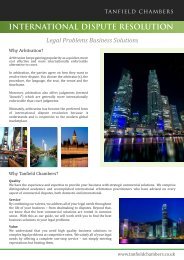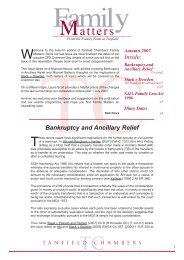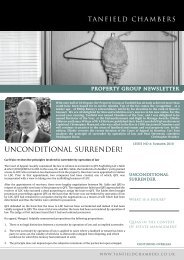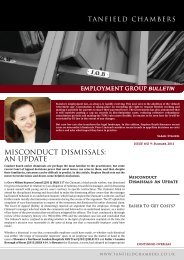June 2011 - Tanfield Chambers
June 2011 - Tanfield Chambers
June 2011 - Tanfield Chambers
- No tags were found...
You also want an ePaper? Increase the reach of your titles
YUMPU automatically turns print PDFs into web optimized ePapers that Google loves.
SERVICE CHARGES AND ESTATE MANAGEMENTJUNE <strong>2011</strong> UPDATEJean-Paul v Southwark LBC [<strong>2011</strong>] UKUT 178 (LC)Issues: (1) When are costs “incurred” for purposes of s.20B; and (2) Whether letterschasing payment of an estimated demand satisfied the requirements of s.20B(2)FactsIn 2004 the landlord council proposed to carry out major works to Block One andBlock Two, Stanswood Gardens. The tenants' flat is in Block Two. On 27 July 2004the council gave notice under s.20 and identified as the estimated contribution for thetenants' flat £44,657.40.On 16 October 2004 the council sent an invoice to the tenants for £44,657.40, givingas the account details "Estimate Charge: Refurbishment Stanswood Gardens." On17 March 2005 the council wrote to the tenants confirming the sums outstanding.The council wrote again on 19 August 2005 and on 17 February 2006 in the sameterms as the letter dated 17 March 2005. The tenants never made a payment.Between 22 December 2004 and 24 August 2005 the council made eight paymentsunder the contract for the major works, totalling £1,067,814.39. Further paymentswere made in March 2006 and March 2007. The council's evidence to the LVT wasthat the final account was agreed with the contractor in <strong>June</strong> 2007, although the finalaccount was not issued until September 2008. On 1 October 2008 the council wroteto the tenants with the final account for their flat. It adjusted downward theircontribution to £39,049.43. The final account was rendered by the contractorimmediately before the demand of 1 October 2008.Tenants’ argumentThe tenants argued before the LVT that, by reason of section 20B, none of theamount demanded from them was payable, because the costs were incurred morethan 18 months previously (and no valid demand had yet been made) and nonotification under subsection (2) had been given. The LVT rejected that argument,
holding that the letters in 2005 and 2006 chasing payment for the major workssatisfied section 20B(2).On appeal, the tenants argued that the requirement in s20B was to specify the costswhich had been incurred and that none of the letters did this. The amount referred toin the letters, £44,657.40, was the estimated contribution and not the costs whichhad been incurred. Although payments had been made at the time of the letters of17 March 2005, 18 October 2005 and 17 February 2006, the amount stated in theletter was not related to these.Held: the LVT was correct to conclude that the letters constituted notifications for thepurposes of section 20B(2). The letters had to be read in context.The President (HHJ Bartlett QC) at para 17-18:“Costs are only "incurred" by the landlord within the meaning of section20B when payment is made. There is clearly a distinction betweenincurring liability (i.e. an obligation to pay) and incurring costs, and it is thelatter formulation that is used in the provision.“[It is not clear how much of] the payments under the contract had beenmade at the time that each letter ... was sent ... is attributable to works forthe cost of which the tenants were potentially liable. It could be the totalityof the amount demanded of them; it could be something less. The final twopayments were made by the council in March 2006 and March 2007, butno demand or other notification was sent to the tenants between the letterof 17 February 2006 and the demand of 1 October 2008. If any part ofthese final payments related to works for the cost of which the tenantswere potentially liable, none of this would be recoverable because thedemand of 1 October 2008 was more than 18 months after the costs wereincurred.“For the purpose of determining whether the letters requesting payment orany of them constituted notification under section 20B(2) it is in myjudgment right ... that these should be read in context. At the time theinvoice for "Estimate Charge", 16 October 2004, the works had notcommenced. At the time the first letter was sent on 17 March 2005 theworks had been under way for four months and four payments had beenmade by the council to the contractors. By the time of the letter of 18October 2005 the works had been completed and four further paymentshad been made. Under section 20B(2) the tenant must have been notified"that those costs had been incurred". Each of the letters referred to theamount of "£44,657.40 in relation to Refurbishment Works conducted onStanswood Gardens and invoiced in October 2004". The words"Refurbishment Works conducted on Stanswood Gardens" clearly meantthe works being carried out or having been carried out at the date of theletter. For these the council had incurred costs through making paymentsto the contractors. The amount of £44,657.40 was an overstatement ofthose costs, since it was the amount that had been invoiced in October2004 in advance of the works commencing, but an overstatement of the
costs incurred would not in my judgment prevent a demand being anotification for the purposes of section 20B. Given the purpose of theprovision as articulated by Etherton J in Gilje, the demand would havefulfilled its function.”Comment: Counsel for the tenants accepted that this was a technical argument andthat, having accepted that the council had incurred a substantial liability and that thework had been done to a satisfactory standard, the tenants’ claim was unmeritorious.Landlords will be pleased to see common sense being applied.Notes contained in rent demand notice to long residential leaseholderscorrectedThe Landlord and Tenant (Notice of Rent) (England) Regulations 2004 (SI2004/3096) came into force on 28 February 2005. The regulations relate to the formand content of notices requiring payment of ground rent in respect of residentialleases.The form of the rent demand notice is contained in the schedule to the regulationsand contains "notes for leaseholders". Paragraph 3 of the notes previously statedthat:"Section 167 of the Commonhold and Leasehold Reform Act 2002 andregulations made under it prevent your landlord from forfeiting your leasefor non-payment of rent, service charges or administration charges (or acombination of them) if the amount owed is £350 or less, or none of theunpaid amount has been outstanding for more than three years."It came to the attention of the Department for Communities and Local Government(DCLG) that this paragraph was misleading. Consequently, on 17 May <strong>2011</strong>, theDCLG published a correction slip dealing with paragraph 3.Paragraph 3 of the notes now make it clear that forfeiture action cannot be taken fornon-payment of rent, service charges or administration charges (or a combination ofthese) unless the unpaid amount is more than £350 or consists of (or includes) anamount which has been outstanding for more than three years (see DCLG: Changeto ground rent notice (May <strong>2011</strong>)). The notes now accurately reflect section 167 ofthe Commonhold and Leasehold Reform Act 2002 and the regulations made underit.JONATHAN UPTONTANFIELD CHAMBERSLONDON1 ST JUNE <strong>2011</strong>


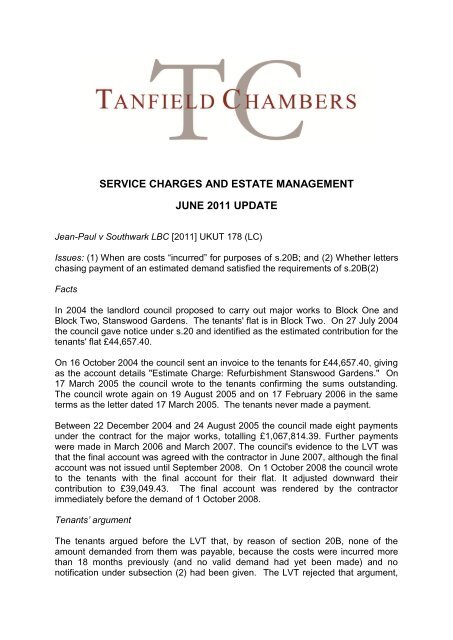
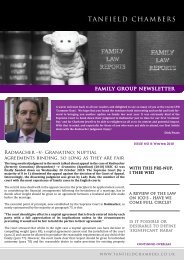


![Re Clarise Properties Ltd [2012] UKUT 4 (LC) - Tanfield Chambers](https://img.yumpu.com/36301708/1/190x245/re-clarise-properties-ltd-2012-ukut-4-lc-tanfield-chambers.jpg?quality=85)



